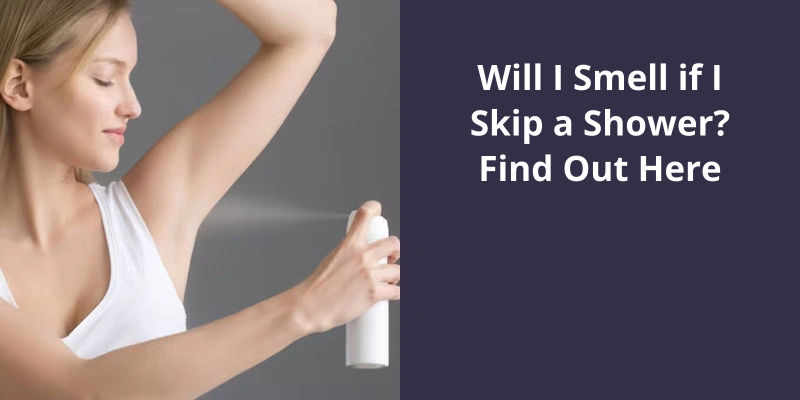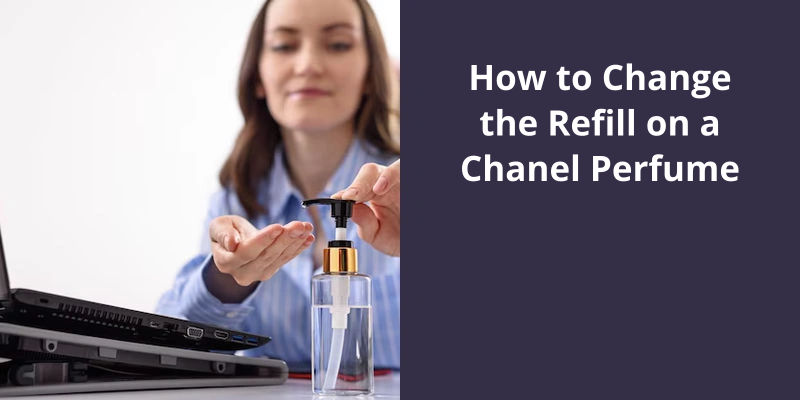It's a question that many of us have asked ourselves at least once in our lives: will I smell if I skip a shower? While there may be times when you simply don't have the time or opportunity to shower, it's important to realize that skipping even a single shower can have consequences for your body odor. Our bodies naturally produce sweat, which provides the perfect breeding ground for bacteria to thrive. When sweat mixes with bacteria, it's broken down into acid that can produce an unpleasant odor.

Do You Stink if You Don’t Shower?
Over time, this creates a potent concoction of smells that can quickly become overwhelming, especially in warmer weather or during physical activity. The longer you go without showering, the worse it becomes, as the bacteria have more time to multiply and spread.
In addition to odor, skipping showers can also lead to itchy, flaky skin and even acne breakouts. This is because dead skin cells, oil, and dirt build up on the surface of your skin, clogging pores and irritating sensitive areas. This can lead to inflammation and infection, making it uncomfortable or even painful to touch certain areas of your body.
But it’s not just your skin that can suffer from infrequent bathing. Your hair can also be negatively affected, becoming oily, greasy, and difficult to manage. This is because the natural oils on your scalp build up over time, making hair look and feel dirty and unwashed. This can be especially problematic for those with longer hair, as tangles and knots can form more easily.
From odor and skin irritation to social and emotional implications, personal hygiene is an important part of maintaining your health and well-being. So if you havent showered in a while, it’s time to hit the soap and water!
Therefore, it’s essential to maintain proper hygiene practices and shower regularly to keep your skin healthy and free from any infections or irritations. However, a daily shower might not be necessary for everyone, and it’s crucial to find a routine that suits your skin’s needs.
What Happens When You Stop Taking Showers?
Additionally, your body may begin to give off a distinct odor, as sweat and bacteria build up on the skin. This smell can become particularly noticeable in areas where sweat tends to accumulate, such as the armpits and groin.
In the long term, skipping showers can also lead to more serious health problems. Poor hygiene can increase your risk of bacterial or fungal infections, especially on the feet and in the groin area. These infections can be difficult to treat and may require medical intervention.
Taking a shower can help to refresh and energize you, leading to improved mood and motivation. Without regular showers, it can be difficult to feel at your best both mentally and physically.
The Benefits of Taking Regular Showers for Mental Health and Wellbeing
Regular showers have been shown to provide numerous benefits for mental health and overall wellbeing. They can help to reduce stress and anxiety, promote relaxation and better sleep, improve self-esteem and confidence, and boost mood and energy levels. Taking a shower also provides a refreshing and cleansing experience that can serve as an important self-care ritual. Overall, regular showers are an important component of a healthy self-care routine that can improve mental health and wellbeing.
Proper hygiene is essential to maintaining good health and preventing unpleasant body odors. However, even after a thorough shower, some people may still experience lingering smells that leave them feeling self-conscious and embarrassed. In many cases, bacteria hiding in hard-to-reach places such as underarm and groin hair may be to blame. In this article, we’ll explore why some people may still smell bad after taking a shower and offer practical tips to help combat persistent body odor.
Why Do I Still Smell Bad After Taking a Shower?
Additionally, an insufficiently washed towel could also be the culprit for your lingering body odor. After a shower, vigorously scrub your body with soap and rinse thoroughly to get rid of any sweat, dirt, and bacteria. However, if you dry yourself off with a towel that still has bacteria on it, it’s like taking one step forward and two steps back. Make sure to wash your towel thoroughly between uses and to avoid sharing towels with others.
Another reason why you might still smell bad after a shower is that youre not using the right products. Not all soaps and body washes are created equal, and many contain harsh chemicals that can strip your skin of it’s natural oils and disrupt your balanced microbiome. Look for products that are pH-balanced, fragrance-free, and contain natural ingredients like tea tree oil, witch hazel, and aloe vera.
For some people, diet can also play a major role in body odor. Certain foods, such as garlic, onions, and spicy foods, can be excreted through your sweat glands and cause a distinctive odor. If you notice that your body odor is worse after eating certain foods, try to limit your consumption or avoid them altogether.
Lastly, it’s possible that your body odor is an indication of an underlying health condition. Excessive sweating, also known as hyperhidrosis, can be a sign of an overactive thyroid or other medical condition. Certain genetic disorders can also cause a distinctive body odor. If youve tried all of the above methods and your body odor persists, it may be worth consulting with a doctor to rule out any underlying health issues.
Shaving the hair in your armpits, groin, and chest, washing your towel, using the right products, watching your diet, and addressing any underlying health issues can all help to eliminate body odor. Remember, everyone has a natural scent, but with a little effort, you can ensure that it’s not overpowering or offensive to others.
The Relationship Between Body Odor and Personal Hygiene Habits, Such as Shower Frequency and Proper Hand-Washing Techniques.
This topic explores the connection between how often someone takes a shower, washes their hands, and their body odor. It aims to understand how personal hygiene habits can impact how a person smells.
Source: Why do I smell bad even after I shower?..
So, the answer to the question “why do I smell more when I shower more often?” isn’t as straightforward as we might think. In fact, it turns out that frequent showering may actually be counterproductive when it comes to fighting body odour. Let’s take a closer look at the reasons behind this phenomenon.
Why Do I Smell More When I Shower More Often?
When we shower more often, we strip away the natural oils on our skin that are essential for keeping bacteria at bay. These oils create a protective barrier on our skin, preventing the growth of odor-causing bacteria.
It’s worth noting that not all bacteria on our skin are bad.
Now that we know how long we can go without taking a shower, it’s important to understand the potential consequences of neglecting personal hygiene. From skin irritation to infection, the effects of failing to keep yourself clean can take a toll on your health and wellbeing. Let’s take a closer look at what happens when we don’t shower regularly.
How Long Can You Go Without a Shower Before You Smell?
This build-up would create the perfect breeding ground for bacteria, which are constantly present on our bodies. With no way to effectively cleanse yourself, these bacteria would begin to create a strong and unpleasant odor. In addition to this, without a shower, you’d be unable to remove any sweat or oils from your body, which would only add to the smell.
Of course, going a full year without a shower is an extreme example. In reality, the amount of time that it takes for someone to start smelling can vary greatly depending on a number of factors. Genetics, diet, age, and even the climate that you live in can all impact how quickly you start to develop body odor. However, most experts agree that it typically takes between two and three days before a person will begin to notice a smell emanating from themselves.
Once again, bacteria are the primary culprit in this smell. As we sweat, our bodies release compounds that the bacteria on our skin consume. These bacteria then release their own waste products, which are often responsible for the unpleasant odor that we associate with sweat. If you don’t shower to remove these compounds and bacteria regularly, they’ll continue to build up and create an increasingly pungent smell.
Of course, some people are able to go longer without showering than others. This is often due to differences in their skin microbiome – the collection of microorganisms that live on our skin. Some people naturally have a higher concentration of odor-fighting bacteria on their skin, which can help to prevent the build-up of stinky sweat and oils. Additionally, some people may simply be less sensitive to their own body odor than others, meaning that they can go longer without noticing a smell.
While it’s technically possible to go a full year without showering, doing so would almost certainly result in an unpleasant odor. However, in general, most people will start to notice a smell after only a few days without showering. This smell is caused by bacteria and sweat build-up on the skin, and can be prevented by regularly washing your body to remove these compounds.
Tips for Maintaining Good Personal Hygiene While Camping or Without Access to a Shower
- Bring biodegradable wipes to clean your body
- Use hand sanitizer frequently
- Change your underwear daily
- Wear breathable clothing
- Brush your teeth and use mouthwash
- Trim your nails regularly
- Use dry shampoo for your hair
- Wash your face with water and a gentle cleanser
- Carry a small towel to wipe away sweat
- Take a dip in a nearby lake or stream for a quick bath
Despite societal norms advocating for daily showers, many experts are now suggesting that showering every day may not be necessary for maintaining good hygiene. In fact, going two, three, or even four days without washing up may be perfectly acceptable, as long as you don’t smell bad. In this article, we’ll explore the benefits and drawbacks of showering less often and offer some tips to keep you smelling fresh between washes.
How Long Is It Good to Go Without Showering?
Cleanliness and hygiene are essential aspects of our daily lives. We tend to associate cleanliness with showering every day, but is it necessary? As per the expert Jennifer Rodney, MD, showering every day isn’t necessary. In fact, going without showering for two, three, and even four days is acceptable as long as you don’t emit any unpleasant odors. The body has natural bacteria that protect us from harmful germs, and it isn’t imperative to wash them off every day.
Several factors determine how often someone should shower. People living in humid or sweaty environments may need to shower more often than those living in dry, colder environments. If someone suffers from a skin condition such as eczema or acne, daily showering may worsen their skin.
Otherwise, skip that stressful morning rush of showering – your body and mind will thank you.
Conclusion
Personal hygiene is essential for maintaining a healthy lifestyle, and regularly showering or bathing is a simple yet crucial part of it. In conclusion, while it may be tempting to skip a shower here and there, it's important to prioritize personal hygiene to maintain a healthy and pleasant odor.





